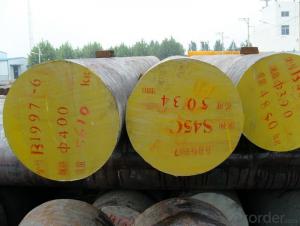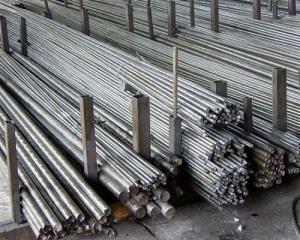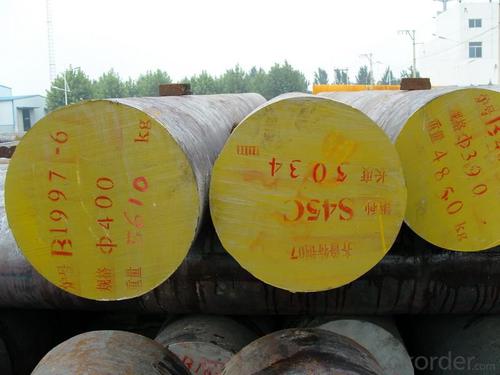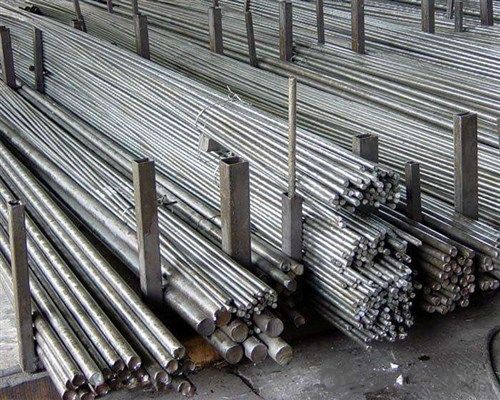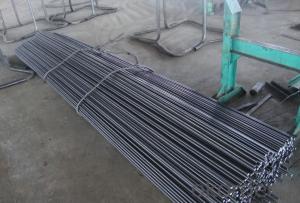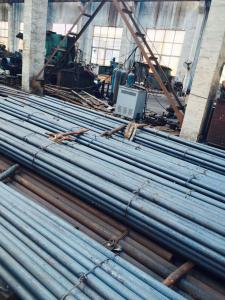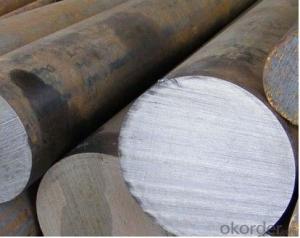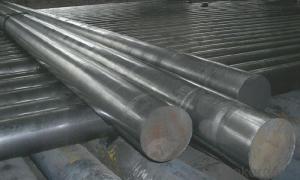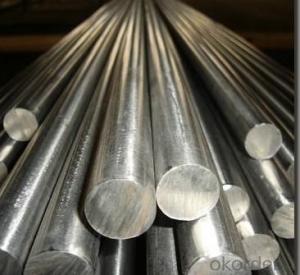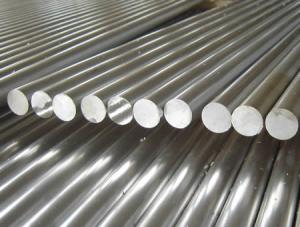T10 Cold Drawn Steel Round Bar with Various Thickness
- Loading Port:
- China main port
- Payment Terms:
- TT OR LC
- Min Order Qty:
- 25 m.t.
- Supply Capability:
- 10000 m.t./month
OKorder Service Pledge
OKorder Financial Service
You Might Also Like
Specification
The details of our Steel
1. Produce Standard: as the GB, AISI, ASTM, SAE, EN, BS, DIN, JIS Industry Standard
2. Produce processes: Smelt Iron -EAF smelt Billet - ESR smelt Billet -Hot rolled or forged get the steel round bar and plate
3. Heat treatment:
Normalized / Annealed / Quenched+Tempered
4. Quality assurance:
All order we can received Third party inspection, You can let SGS, BV,.. and others test company test and inspect our products before Goods shipping.
Product information
Round bar: |
Diameter : 3.2mm-2000mm |
Square bar: |
Size: 50mm * 50mm-600mm *600mm |
Plate steel/flat bar: |
Size: Thickness: 0.1mm-800mm Width: 10mm to 1500mm |
Tube/pipe: |
Size: OD: 6-219mm WT: 1-35 mm. |
Cold-rolled sheet: |
Thickness: 2-5mm Width:1000mm Length: 2000mm |
Hot-rolled sheet: |
Thickness:6-80mm Width: 210-610mm |
Length: |
We can supply any length based on the customer's requirement. |
Characters:
1, good comprehensive properties
2, good perfomance in cutting and processing after spheroids annealing
3, high hardness and homogrnization after quenching and tempering
4, high abrasive resistance and fatigue resistance
5, large amount of metal elements
6, lowest price
Product show

Workshop show

- Q: What are the different cutting tools used for special steel?
- There are several different cutting tools that are commonly used for special steel applications. These tools are specifically designed to handle the unique properties and characteristics of special steel, which often requires more precise and specialized cutting techniques. Some of the most commonly used cutting tools for special steel include: 1. Carbide tipped saw blades: These saw blades have carbide teeth, which are extremely hard and durable. They can cut through special steel with ease, providing clean and accurate cuts. 2. High-speed steel (HSS) cutting tools: HSS cutting tools are made from a type of tool steel that can withstand high temperatures and maintain their hardness. These tools are commonly used for drilling, milling, and turning operations on special steel. 3. Diamond cutting tools: Diamond is one of the hardest materials known to man, making it ideal for cutting through tough materials like special steel. Diamond cutting tools, such as diamond-coated saw blades or grinding wheels, are commonly used in special steel applications. 4. Waterjet cutting machines: Waterjet cutting machines use a high-pressure stream of water mixed with abrasive particles to cut through special steel. This method is particularly suitable for complex shapes and intricate designs. 5. Plasma cutting machines: Plasma cutting machines use a high-velocity jet of ionized gas to cut through special steel. This method is often used for cutting thick sections of special steel quickly and efficiently. 6. Laser cutting machines: Laser cutting machines use a highly focused laser beam to cut through special steel. This method offers high precision and can be used to cut complex shapes and patterns. It is important to choose the appropriate cutting tool based on the specific requirements of the special steel being worked with, as well as the desired cutting method and application. Consulting with a specialist or referring to the manufacturer's recommendations can help ensure the best cutting tool is selected for the job.
- Q: What are the different surface protection methods used for special steel?
- To enhance the durability and resistance of special steel, several methods of surface protection are employed. Galvanizing is a commonly utilized technique, wherein a layer of zinc is applied to the steel surface. This shields the steel from corrosion and rusting, thereby prolonging its lifespan and preserving its appearance. Galvanizing can be executed through either hot-dip galvanizing or electroplating, depending on the specific requirements of the steel. Another method is powder coating, which entails the application of a dry powder to the steel surface, followed by curing at high temperatures. This results in the formation of a protective layer that is impervious to chipping, scratching, and fading. Powder coating is often chosen for its aesthetic benefits, as it offers a wide range of color options and can enhance the visual appeal of the steel. Furthermore, various types of paints and coatings can be employed to protect special steel. These coatings can be applied using a spray or brush technique, and they serve as a barrier against corrosion, chemicals, and UV radiation. Depending on the specific needs and environmental conditions, epoxy, polyurethane, and acrylic coatings are frequently utilized. Moreover, stainless steel possesses inherent resistance to corrosion due to its composition. However, to further safeguard it, passivation can be employed. Passivation involves a chemical treatment that eliminates iron particles from the surface, thus preventing corrosion and improving the steel's resilience against staining and pitting. Lastly, a layer of ceramic or enamel coating can be applied to protect special steel. These coatings offer high levels of resistance to heat, chemicals, and physical abrasion. They can be applied through spraying or dipping and are commonly used in environments where the steel will be exposed to extreme conditions or aggressive substances. In conclusion, the various surface protection methods utilized for special steel encompass galvanizing, powder coating, painting, passivation, and ceramic/enamel coating. These methods aim to enhance the steel's durability, corrosion resistance, and overall lifespan, ensuring that it can withstand diverse environmental factors while maintaining its structural integrity.
- Q: What are the different forging grades of special steel?
- There are several different forging grades of special steel, including but not limited to stainless steel, alloy steel, carbon steel, tool steel, and high-speed steel.
- Q: How does special steel perform in high-velocity impact conditions?
- Special steel is specifically engineered to excel in high-velocity impact situations, providing outstanding performance. Its composition and metallurgical properties are unique, resulting in remarkable resistance to deformation and failure under extreme forces. A key characteristic of special steel is its exceptional strength, enabling it to withstand the immense forces encountered in high-velocity impact scenarios. This strength is achieved through meticulous alloying and heat treatment processes that enhance the material's capacity to absorb and distribute energy. Consequently, special steel can effectively resist deformation and preserve its structural integrity even when subjected to severe impact loads. Moreover, special steel possesses remarkable toughness, allowing it to absorb significant amounts of energy before fracturing. This characteristic is crucial in high-velocity impact conditions where the material must endure sudden and intense forces. The high toughness of special steel permits it to absorb and dissipate the impact energy, preventing catastrophic failure and ensuring the ongoing performance of the component or structure. Additionally, special steel often exhibits superb resistance to wear and abrasion, which is advantageous in high-velocity impact scenarios involving sliding or rubbing contact. This wear resistance guarantees that the material maintains its integrity and functionality even during prolonged and repetitive impact conditions, reducing the risk of premature failure. Overall, special steel excels in high-velocity impact conditions due to its exceptional strength, superb toughness, and superior wear resistance. Its ability to withstand extreme forces and efficiently absorb impact energy makes it the preferred choice for applications where durability and reliability are of utmost importance.
- Q: What are the specific requirements for special steel used in the agricultural sector?
- The specific requirements for special steel used in the agricultural sector typically include high strength, corrosion resistance, and durability. This is necessary to withstand harsh environmental conditions, heavy loads, and exposure to various chemicals and fertilizers. Additionally, the steel should have good weldability and formability to facilitate manufacturing processes.
- Q: Can special steel be used in electrical applications?
- Special steel can indeed find its use in electrical applications. There exist specific properties in special steel alloys, like stainless steel or tool steel, that render them appropriate for usage in electrical applications. These properties encompass excellent electrical conductivity, remarkable resistance against corrosion, and commendable strength. To illustrate, stainless steel frequently finds its application in electrical enclosures, wire mesh, and connectors, owing to its ability to ward off corrosion caused by moisture or chemicals. Conversely, tool steel is commonly employed in the production of electrical tools and equipment, such as pliers or screwdrivers, due to its superior strength and durability. On the whole, special steel alloys can provide the desired electrical properties and performance required for diverse electrical applications.
- Q: How does special steel contribute to improving product quality?
- Special steel contributes to improving product quality in several ways. Firstly, it offers superior strength and durability compared to regular steel, making it ideal for applications that require high performance and reliability. This ensures that products made with special steel will have a longer lifespan and reduced chances of failure, thereby enhancing overall quality. Additionally, special steel can be tailored to have specific properties like corrosion resistance, heat resistance, or magnetic properties, which are crucial in various industries such as automotive, aerospace, and medical. By using special steel, manufacturers can produce products that meet specific performance requirements, resulting in improved quality and customer satisfaction.
- Q: What are the requirements for special steel used in oil and gas equipment manufacturing?
- The requirements for special steel used in oil and gas equipment manufacturing are quite stringent due to the demanding operating conditions and harsh environments that these materials will be exposed to. Some of the key requirements include: 1. Corrosion Resistance: Special steel used in oil and gas equipment must have excellent resistance to corrosion, especially in the presence of various corrosive fluids such as oil, gas, and saltwater. This helps to prevent degradation and premature failure of the equipment. 2. High Strength: The steel must possess high strength and toughness to withstand the extreme pressures, temperatures, and mechanical stresses encountered in oil and gas operations. This ensures that the equipment can perform reliably under demanding conditions. 3. Heat Resistance: Oil and gas equipment often operates at elevated temperatures, especially in downstream processes such as refining and petrochemical applications. Special steel used in these applications must be able to maintain its mechanical properties and structural integrity even at high temperatures. 4. Weldability: Welding is a common joining technique used in the fabrication of oil and gas equipment. The special steel should have good weldability, allowing for efficient and reliable welding processes without compromising the overall strength and integrity of the equipment. 5. Fatigue Resistance: Oil and gas equipment is subjected to cyclic loading, which can lead to fatigue failure if the material is not properly designed to withstand these repetitive stresses. Special steel must possess good fatigue resistance properties to ensure long-term durability. 6. Low Temperature Properties: In certain applications, such as offshore drilling or arctic environments, the equipment may be exposed to extremely low temperatures. The special steel should exhibit excellent toughness and ductility at low temperatures to prevent brittle fracture. 7. Chemical Composition Control: The chemical composition of the special steel must be tightly controlled to ensure consistent and predictable material properties. This involves strict control over the levels of various alloying elements, impurities, and trace elements to meet the specific requirements of the oil and gas industry. Meeting these requirements is crucial for the safe and reliable operation of oil and gas equipment. Special steel manufacturers work closely with industry standards and specifications to develop and provide materials that meet these demanding requirements, ensuring the integrity and performance of the equipment in the oil and gas sector.
- Q: What are the different non-metallic inclusions in special steel?
- The different non-metallic inclusions commonly found in special steel include oxides, sulfides, nitrides, and carbides. These inclusions can have various shapes and sizes, and their presence can significantly affect the mechanical properties and performance of the steel.
- Q: What are the main factors affecting the fracture toughness of special steel?
- The fracture toughness of special steel can be affected by several key factors, encompassing: 1. Alloy composition: The fracture toughness of the steel can be greatly influenced by its specific chemical composition, including the type and amount of alloying elements. Elements like chromium, nickel, and molybdenum have the potential to enhance toughness by promoting the formation of fine-grained microstructures or improving the steel's ability to resist crack propagation. 2. Heat treatment: Determining the fracture toughness of the steel is heavily reliant on the temperature and duration of the heat treatment process, as well as the subsequent cooling. Proper heat treatment can refine the microstructure and eliminate any potential defects, thereby enhancing the steel's resistance to fracture. 3. Microstructure: The fracture toughness of the steel is profoundly impacted by its microstructure, encompassing grain size and distribution, phase composition, and the presence of inclusions. Generally, finer-grained structures exhibit higher toughness due to their improved resistance to crack propagation. 4. Existence of defects: The presence of defects, such as cracks, voids, or inclusions, within the steel can act as stress concentrators, ultimately diminishing its fracture toughness. These defects can initiate cracks and facilitate their propagation, ultimately leading to reduced toughness. 5. Temperature: Fracture toughness is contingent upon temperature, and the behavior of special steel can significantly vary at different temperature ranges. Some steels exhibit improved toughness at lower temperatures due to microstructural transformations, while others may experience decreased toughness at elevated temperatures due to material softening. 6. Loading conditions: The fracture toughness of special steel can also be impacted by the loading conditions, including the rate of loading or the presence of dynamic loading. Higher loading rates or dynamic loading can result in reduced toughness, as the steel may not have sufficient time to deform and absorb energy before fracturing. 7. Mechanical properties: The mechanical properties of the steel, such as strength, hardness, and ductility, can influence its fracture toughness. Higher strength and hardness can sometimes lead to decreased toughness, as the material becomes more brittle. However, a balance between strength and toughness can be achieved by carefully selecting the alloy composition and heat treatment parameters. In summary, the fracture toughness of special steel is determined by a complex interplay of various factors, including alloy composition, heat treatment, microstructure, defects, temperature, loading conditions, and mechanical properties. By optimizing these factors, the fracture toughness of special steel can be enhanced for specific applications.
Send your message to us
T10 Cold Drawn Steel Round Bar with Various Thickness
- Loading Port:
- China main port
- Payment Terms:
- TT OR LC
- Min Order Qty:
- 25 m.t.
- Supply Capability:
- 10000 m.t./month
OKorder Service Pledge
OKorder Financial Service
Similar products
Hot products
Hot Searches
Related keywords
